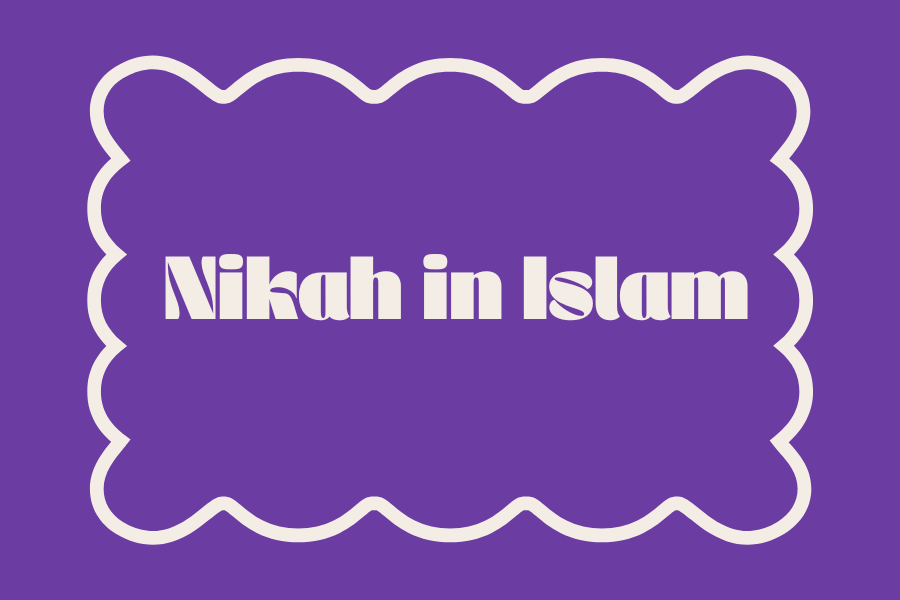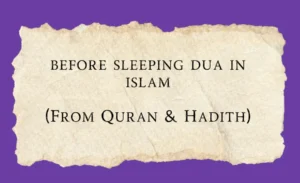Nikah or marriage in Islam is one of the most sacred and significant institutions that Allah ﷻ has ordained for mankind. It is not merely a worldly contract but a divine covenant (Mithaq Ghalidh) that establishes a lawful and pure relationship between a man and a woman. Through Nikah, Islam safeguards human dignity, preserves morality, and strengthens family life, which in turn forms the foundation of a healthy and righteous society.
The Qur’an and Sunnah repeatedly emphasize the importance of marriage as a means of fulfilling human needs in a lawful manner while drawing closer to Allah. It is through marriage that love, compassion, and mercy are nurtured between spouses, ensuring both spiritual and emotional well-being. Allah ﷻ describes this bond beautifully in the Qur’an:
Arabic: وَمِنْ آيَاتِهِ أَنْ خَلَقَ لَكُم مِّنْ أَنفُسِكُمْ أَزْوَاجًا لِّتَسْكُنُوا إِلَيْهَا وَجَعَلَ بَيْنَكُم مَّوَدَّةً وَرَحْمَةً
Transliteration:
Wa min āyātihi an khalaqa lakum min anfusikum azwājan litaskunū ilayhā wa ja‘ala baynakum mawaddatan wa raḥmah.
Translation:
“And among His signs is that He created for you spouses from among yourselves, so that you may find tranquility in them; and He placed between you affection and mercy.” (Surah Ar-Rum 30:21)
Marriage in Islam is therefore not only about companionship but also about worship and fulfilling half of one’s faith. The Prophet Muhammad ﷺ said:
Arabic: إِذَا تَزَوَّجَ الْعَبْدُ فَقَدِ اسْتَكْمَلَ نِصْفَ الدِّينِ
Transliteration: Idhā tazawwaja al-‘abdu faqad istakmala nisfa ad-dīn.
Translation: “When a person marries, he has completed half of his religion; so let him fear Allah in the other half.” (Bayhaqi, Shu‘ab al-Iman, Hadith 5100)
Thus, Nikah is not simply a personal choice, it is a Sunnah of the Prophet ﷺ, a shield against sin, and a source of peace and blessings in this world and the Hereafter.
Keep reading this blog to explore the significance of Nikah in Islam, its conditions, rights, and blessings as taught in the Qur’an and Sunnah.
What Actually is Nikah?
Nikah in Islam is a sacred contract (ʿAqd) between a man and a woman that makes their relationship lawful in the eyes of Allah ﷻ. It is not merely a social arrangement but an act of worship and obedience to Allah, as it fulfills human needs within the framework of Shariah. Through Nikah, both partners commit to rights, responsibilities, and mutual respect, creating a bond built upon love, mercy, and tranquility. The Qur’an refers to marriage as a “Mithaq Ghalidh” (a solemn covenant), highlighting its seriousness and sanctity. Unlike casual relationships or cultural customs, Nikah ensures protection of faith, lineage, family structure, and society at large, making it one of the most important institutions in Islam.
How is Nikah Performed in Islam?
Nikah is performed as a simple yet sacred ceremony in accordance with Islamic guidelines. It does not require extravagant rituals but must fulfill the conditions set by the Qur’an and Sunnah. The process typically includes:
- Proposal and Acceptance (Ijab-o-Qubool): The wali (guardian) of the bride offers her in marriage, and the groom accepts in clear words before witnesses.
- Consent of Both Parties: Both the bride and groom must willingly agree to the marriage without force or pressure.
- Mahr (Dowry): The groom presents a gift or dowry to the bride, which is her exclusive right as commanded in Islam.
- Witnesses: At least two reliable Muslim witnesses must be present to validate the contract.
- Nikah Khutbah (Marriage Sermon): Usually delivered by an imam or scholar, it includes Qur’anic verses and hadiths about marriage.
- Dua and Announcement: After the contract is complete, supplications are made for the couple, and the marriage is publicly announced.
Nikah is thus both a legal contract and an act of worship, carried out with simplicity, dignity, and blessings.
Important Quranic Verses on Nikah
The Qur’an highlights marriage as a source of peace, mercy, and lawful companionship, emphasizing that it is a divine blessing and a strong covenant between spouses. These verses guide Muslims to understand the sacredness of Nikah and the responsibilities it entails.
Let’s take a look at some important verses from the Qur’an about Nikah.
1. Nikah as a Sign of Allah’s Mercy
Marriage in Islam is described as one of the great signs of Allah’s mercy, where spouses are brought together to find peace, love, and comfort in one another. Through Nikah, Allah ﷻ places mawaddah (affection) and rahmah (mercy) between husband and wife, making it a divine source of harmony and tranquility.
Arabic: وَمِنْ آيَاتِهِ أَنْ خَلَقَ لَكُم مِّنْ أَنفُسِكُمْ أَزْوَاجًا لِّتَسْكُنُوا إِلَيْهَا وَجَعَلَ بَيْنَكُم مَّوَدَّةً وَرَحْمَةً
Transliteration: Wa min āyātihi an khalaqa lakum min anfusikum azwājan litaskunū ilayhā wa ja‘ala baynakum mawaddatan wa raḥmah.
Translation: “And among His signs is that He created for you spouses from among yourselves, so that you may find tranquility in them; and He placed between you affection and mercy.” (Surah Ar-Rum 30:21)
2. Command to Marry the Righteous
The Qur’an encourages believers to marry those who are single and righteous, highlighting that marriage is a means of preserving faith and building a pure society. By choosing pious partners, Muslims safeguard morality and strengthen family life according to Islamic values.
Arabic: وَأَنكِحُوا الْأَيَامَىٰ مِنكُمْ وَالصَّالِحِينَ مِنْ عِبَادِكُمْ وَإِمَائِكُمْ
Transliteration: Wa ankiḥū al-ayāmā minkum waṣ-ṣāliḥīna min ‘ibādikum wa imā’ikum.
Translation: “And marry off those among you who are single and the righteous among your male and female servants.” (Surah An-Nur 24:32)
3. The Contract of Nikah
The Qur’an refers to marriage as a “Mithaq Ghalidh” (a strong covenant), showing that Nikah is not a casual agreement but a binding and sacred contract. It establishes mutual rights and responsibilities between spouses, ensuring justice, respect, and commitment in their relationship.
Arabic: وَأَخَذْنَ مِنكُم مِّيثَاقًا غَلِيظًا
Transliteration: Wa akhadhna minkum mīthāqan ghalīẓan.
Translation: “And they (wives) have taken from you a strong covenant.” (Surah An-Nisa 4:21)
Hadiths on Marriage (Nikah)
The sayings of Prophet Muhammad ﷺ highlight the importance of Nikah as a Sunnah, a safeguard against immorality, and a means of completing one’s faith. These hadiths provide clear guidance on choosing righteous partners and maintaining a blessed marital life.
Let’s take a look at some significant hadiths about marriage in Islam.
1. Marriage is Sunnah of the Prophet ﷺ
The Prophet Muhammad ﷺ encouraged marriage as part of his Sunnah, reminding Muslims that it is a path of purity and obedience to Allah. Rejecting marriage without valid reason goes against his teachings, as Nikah is a means of following his noble way of life.
Arabic: النِّكَاحُ مِنْ سُنَّتِي، فَمَنْ لَمْ يَعْمَلْ بِسُنَّتِي فَلَيْسَ مِنِّي
Transliteration: An-nikāḥu min sunnatī, faman lam ya‘mal bisunnatī falaysa minnī.
Translation: “Marriage is part of my Sunnah, and whoever does not follow my Sunnah has nothing to do with me.” (Ibn Majah, Hadith 1846)
2. Half of Faith
The Prophet ﷺ taught that marriage completes half of a believer’s faith, as it protects from temptation and encourages righteousness. Through Nikah, a Muslim safeguards their modesty and strengthens their commitment to Allah ﷻ in the remaining half of their religion.
Arabic: إِذَا تَزَوَّجَ الْعَبْدُ فَقَدِ اسْتَكْمَلَ نِصْفَ الدِّينِ
Transliteration: Idhā tazawwaja al-‘abdu faqad istakmala nisfa ad-dīn.
Translation: “When a person marries, he has completed half of his religion; so let him fear Allah in the other half.” (Bayhaqi, Shu‘ab al-Iman, Hadith 5100)
3. Choosing a Righteous Spouse
The Prophet ﷺ advised that while people may marry for wealth, beauty, or lineage, true success lies in choosing a partner based on faith and piety. A righteous spouse strengthens one’s deen, builds a peaceful household, and brings lasting blessings in this life and the Hereafter.
Arabic: تُنْكَحُ الْمَرْأَةُ لِأَرْبَعٍ … فَاظْفَرْ بِذَاتِ الدِّينِ تَرِبَتْ يَدَاكَ
Transliteration: Tunkaḥu al-mar’atu li-arba‘in … faẓfar bidhātid-dīn taribat yadāk.
Translation: “A woman is married for four things: her wealth, her lineage, her beauty, and her religion. So choose the one who is religious, may your hands be covered in dust (i.e., may you prosper).” (Bukhari & Muslim)
Conditions and Requirements of Nikah in Islam
For a Nikah to be valid, Islam sets clear conditions that protect the rights of both spouses and ensure fairness in the marriage contract. These include consent, witnesses, the presence of a guardian (wali), and the giving of mahr (dowry), making the union lawful and blessed. For a Nikah to be valid in Islam, certain conditions must be fulfilled:
- Consent of Both Parties: Forced marriages are invalid in Islam.
- Wali (Guardian): The presence of a guardian for the bride.
- Mahr (Dowry): A mandatory gift from the groom to the bride.
- Witnesses: At least two trustworthy witnesses.
- Nikah Khutbah: The sermon and declaration of marriage.
Rights and Responsibilities in Marriage
Islam places great emphasis on balancing the rights and duties of both husband and wife, ensuring harmony and justice within the household. Each spouse is responsible for kindness, respect, and fulfilling their obligations, making the marital bond a source of peace and blessing. Below are some details.
Rights of the Husband:
- To be respected and obeyed in lawful matters.
- To maintain intimacy within halal limits.
- To be supported in his role as provider.
Rights of the Wife:
- Financial maintenance (Nafaqah).
- Protection and security.
- Kind treatment and respect.
Qur’anic Reference:
Arabic: وَعَاشِرُوهُنَّ بِالْمَعْرُوفِ
Transliteration: Wa ‘āshirūhunna bil-ma‘rūf.
Translation: “And live with them in kindness.” (Surah An-Nisa 4:19)
This verse reminds husbands to treat their wives with respect, love, and compassion, making kindness the foundation of marital life. Islam commands that spouses live together in harmony, where good character and gentle conduct strengthen the bond of Nikah.
The Purpose of Marriage in Islam
Marriage in Islam serves to protect faith, preserve modesty, and establish families upon righteousness. It is a means of finding peace, love, and mercy between spouses while strengthening the Muslim community through stable and pious households. The main purpose of Nikah or marriage in Islam are:
- To preserve chastity and modesty.
- To ensure lawful lineage.
- To build a family upon Islamic values.
- To bring peace, love, and mercy between spouses.
- To strengthen the community through strong family units.
Common Misconceptions about Nikah
Below are some common misconceptions about Nikah and the actual truth that debunks them.
Myth: Nikah is just a cultural practice.
Truth: Nikah is an Islamic obligation and Sunnah.
Myth: Women have no say in Nikah.
Truth: Consent of the bride is mandatory in Islam.
Myth: High dowries are required.
Truth: The Prophet ﷺ encouraged simple dowries.
Conclusion
Nikah in Islam is a blessing that brings love, peace, and faith together. It is a protection from sin, a source of tranquility, and a means of fulfilling half of one’s religion. Following the Qur’an and Sunnah ensures that the marriage remains strong, blessed, and filled with barakah (divine blessings). Let’s end the blog with a beautiful Dua for Marriage:
Arabic: رَبَّنَا هَبْ لَنَا مِنْ أَزْوَاجِنَا وَذُرِّيَّاتِنَا قُرَّةَ أَعْيُنٍ وَاجْعَلْنَا لِلْمُتَّقِينَ إِمَامًا
Transliteration: Rabbana hab lana min azwājinā wa dhurriyyātinā qurrata a‘yunin waj‘alnā lil-muttaqīna imāmā.
Translation: “Our Lord, grant us from our spouses and offspring comfort to our eyes and make us leaders for the righteous.” (Surah Al-Furqan 25:74)






